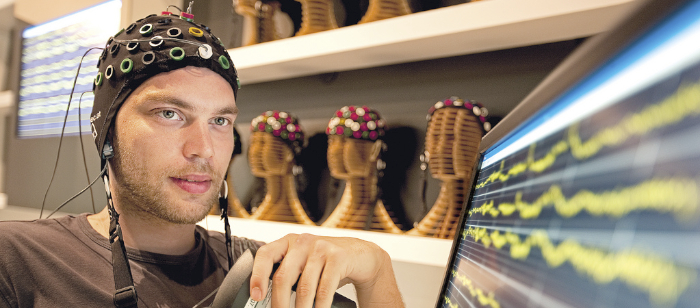
Engineering Week IEEE Student Branch Seminar
in conjunction with CSEE Graduate Seminar
Brain-Computer Interface Technologies
in the Coming Decades (with Demonstration)
Dr. Kaleb McDowell
Translational Neuroscience Branch Chief
Army Research Laboratory
11:30-12:30 Friday, 24 February 2012, ITE 227, UMBC
As the proliferation of technology dramatically infiltrates all aspects of modern life, in many ways the world is becoming so dynamic and complex that technological capabilities are overwhelming human capabilities to optimally interact with and leverage those technologies. Fortunately, these technological advancements have also driven an explosion of neuroscience research over the past several decades, presenting engineers with a remarkable opportunity to design and develop flexible and adaptive brain-based neurotechnologies that integrate with and capitalize on human capabilities and limitations to improve human-system interactions. Major forerunners of this conception are brain-computer interfaces (BCIs), which to this point have been largely focused on improving the quality of life for particular clinical populations and include, for example, applications for advanced communications with paralyzed or "locked-in" patients as well as the direct control of prostheses and wheelchairs. Near-term applications are envisioned that are primarily task-oriented and are targeted to avoid the most difficult obstacles to development. In the farther term, a holistic approach to BCIs will enable a broad range of task-oriented and opportunistic applications by leveraging pervasive technologies and advanced analytical approaches to sense and merge critical brain, behavioral, task, and environmental information. Communications and other applications that are envisioned to be broadly impacted by BCIs are highlighted; however, these represent just a small sample of the potential of these technologies.
Kaleb McDowell (M'08-SM'11) was born in Frederick, MD, USA on July 10, 1970. He has a B.S in operations research and industrial engineering from Cornell University, Ithaca, NY, USA in 1992, an M.S. in kinesiology from the University of Maryland, College Park, MD, USA in 2000, and a Ph.D. in neuroscience and cognitive science from the University of Maryland, College Park, MD, USA in 2003.
He is currently the Chief of the Translational Neuroscience Branch and Chair of the Neuroscience Strategic Research Area at the U.S. Army Research Laboratory (ARL) in Aberdeen Proving Ground, MD, USA. Since joining ARL as a Research Psychologist in 2003, he has contributed to over 30 reviewed publications, and has led several major research and development programs focused on neuroscience, indirect vision systems and vehicle mobility. His current research interest focuses on translating basic neuroscience into applications for use by healthy populations in everyday, real-world environments.
Dr. McDowell received Department of Army Research and Development Achievement awards for technical excellence in 2007 and 2009 and the ARL Award for Leadership in 2011.
Host: IEEE UG and Grad Student Branches (cookies drinks available 11:15am)